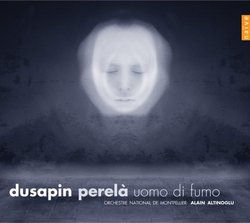| All Artists: Pascal Dusapin, Alain Altinoglu, Nora Gubisch, Orchestre National de montpellier, Chantal Perraud, Isabelle Philippe, John Graham-Hill, Gilles Hubert, Gilles Yanetti, Hervé Martin, Laurent Serou Title: Pascal Dusapin: Perelà, Uomo di Fumo Members Wishing: 1 Total Copies: 0 Label: Disques Montaigne Release Date: 3/22/2005 Genre: Classical Style: Opera & Classical Vocal Number of Discs: 2 SwapaCD Credits: 2 UPC: 822186821688 |
Search - Pascal Dusapin, Alain Altinoglu, Nora Gubisch :: Pascal Dusapin: Perelà, Uomo di Fumo
 | Pascal Dusapin, Alain Altinoglu, Nora Gubisch Pascal Dusapin: Perelà, Uomo di Fumo Genre: Classical |
Larger Image |
CD Details |
CD ReviewsA fantastic new French opera! R. Hutchinson | a world ruled by fossil fuels and fossil minds | 06/21/2005 (5 out of 5 stars) "I use the term fantastic advisedly, because Dusapin's opera is of very high quality, but the fable it tells is fantastic and phantasmagorical as well. PERELA: UOMO DI FUMO is based on the novel "Il codice Perela," by an Italian futurist, Aldo Pallazzeschi, which was published in 1911. The Man of Smoke simply appears one day, and proceeds to cause a sensation. The outline of the story is as follows: "his appearance, his encounter with the people and the notables, his providential designation to draw up the Code (of which we learn nothing), his accusation, trial and condemnation, and finally his return to his original state" (from Antoine Gindt's liner notes).
Unlike many modern operas, Dusapin has written a work with powerful, moving arias, a linear easy-to-follow story, and based on the black-and-white photos in the booklet, stunning costumes and stage design as well. Tenor John Graham-Hall as Perela is terrific throughout, making the cipher of a character much more compelling and sympathetic than the libretto along would lead you to expect, and mezzo-soprano Nora Gibisch as "the love interest," La Marquise Oliva de Bellonda, is superb as well, and has the best arias in the score. There is much comedy and satire, mocking the powerful in the form of a Banker and an Archbishop, among others (similar to Ligeti's LE GRAND MACABRE -- see my review), but PERELA is mainly a tragic work. The central character is an innocent, and there is a clear parallel to Christ in his persecution. Dusapin's music, of course, is what mainly conveys the tragic mood. The orchestral component is quite well-done, though in general I find opera frustratingly episodic as compared to the development and structure found in great symphonies and string quartets. Personally I find it very dissatisfying to only *listen* to opera. For me, the form is so fundamentally visual and dramatic that it just doesn't work as well as other forms of classical music for daily listening. However, I am giving PERELA a full 5 stars because it works so much better than most modern operas. If you follow the libretto, and picture the players based on the photos, huge, outrageous and grotesque, the music gains weight and stature. The recording was made of a live performance in May 2003, but there is virtually no audience noise. What it all means I don't know, but Dusapin has certainly found a vehicle for some rich, evocative music with strong elements of social satire and metaphysical musing. Naive's packaging is exemplary, though unnecessarily bulky -- the jewel-case for the 2 discs is not a slimline, and the booklet is separate -- both are contained in a box. The booklet is extensive (97 pages), and includes an interview with Dusapin, the entire libretto in Italian, French and English (which is particularly useful for direct translation from the Italian to English while listening), and detailed information on the performers. See my recent reviews of Ligeti's LE GRAND MACABRE, Rihm's DIE EROBERUNG VON MEXICO (The Conquest of Mexoco) and Lachenmann's DAS MADCHEN MIT DEN SCHWEFELHOZERN (The Little Match Girl) for modern operas that range from less to much less compelling than PERELA." |
